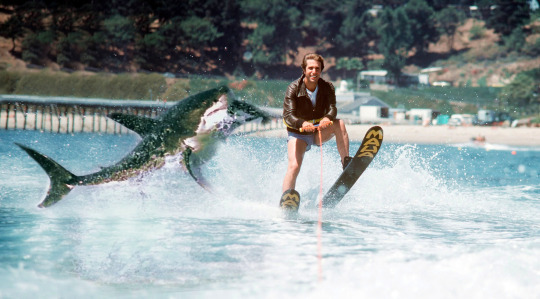The Importance of Jumping the Shark as Early as Possible

With TV shows, “jumping the shark” refers to some change in the status quo, or some kind of event that is so outlandish, it wrecks your belief in the characters or their world. But when you’re writing a novel where some crazy stuff happens, it’s important to jump the shark as early as possible. Preferably on page one, if you can manage it.
That’s one reason why a lot of the craziest stuff in All the Birds in the Sky happens in the first couple chapters—by the end of chapter two, we’ve had talking animals, a miniature time machine, and some other insane stuff. Partly this is about establishing the main characters, Patricia and Laurence, and the world they live in. But I also wanted to make sure that people wouldn’t feel freaked out later in the book, when things start getting wilder and more out of control.
There’s also the fact that my main characters are kids for the first 1/3 of the book, and then they become grown ups, which was something I tried to figure out a way to telegraph on page one or two. Originally, I experimented with having more explicit foreshadowing, like having the narrator butt in and say something about the dark, adult weirdness Patricia was going to have in her life when she was in her twenties. Writing about Patricia’s sister, Roberta, I tried having the narrator drop a huge hint about how messed-up Roberta gets as an adult. I wanted to signal that the book wasn’t always about kids, and that the narrative gets a bit tricksy at times. But no matter how I tried it, this just did not work. So I had to stick to just jumping the shark in the most obvious way: by throwing in some of the most outlandish elements of the story right at the start.
So what I’m saying is, if you gotta jump the shark, make sure you’re in shark-jumping position from the very start. To mix metaphors horribly, a key part of shark-jumping is just ripping the band-aid off.



